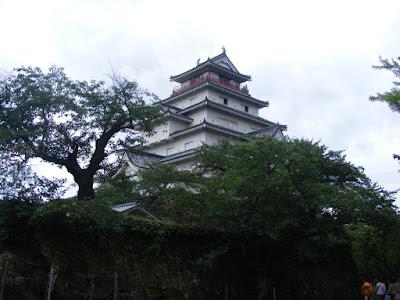桂男
すまずなりけり
雨の月
Katsura-otoko
sumazu nari keri
ame no tsuki
The man in the moon
Has become homeless;
Rain clouded night
Matsuo Bashô (松尾芭蕉) ripped the first two lines from the Tale of Ise.
Sumazu is a kakekotoba meaning either homeless or unclear.
Finally, as we neared Aizu Wakamatsu there were richer valleys with rice fields and stylish traditional farm houses. In the evening we drove up to another lake and stayed the night in a side entrance to avoid the $50 NZ (Y4500) fees for a simple no frills camp site.
Today we went to the reconstructed castle and 17th century tea house and walked up the mountain where 20 young white tiger samurai bar one disemboweled themselves when they saw the rice fields burning below when the town backed the Tokugawas in the face of the successful Meiji restoration.
We're now off further north in the spirit of Bashō, who is famous for making the Haiku into a Satori, although rumours are rife that he was actually a Ninja agent of the government, reporting on any disaffection in the provinces. Anyway, his most famous work was "The Narrow Road to the Far North" an account of his travels through Tohoku in 1689.
- Translations of Bashō's Haikai-no-Renga
- Comparison of translations by R. H. Blyth, Lucien Stryck, and Peter Beilenson of several Bashō haiku.
- Classical Japanese Database






















































 The samurai who committed harakiri and the one who survived.
The samurai who committed harakiri and the one who survived.












0 件のコメント:
コメントを投稿